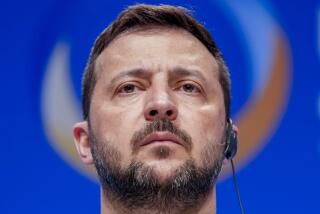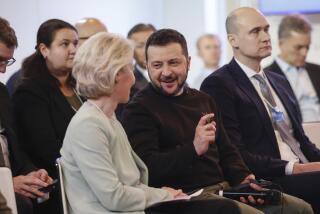NEWS ANALYSIS : Clinton Trip Helps Yeltsin’s Image, Hurts Zhirinovsky : Russia: But unless the country’s president acts out his role more convincingly, the impact of the summit could be short-lived.
- Share via
MOSCOW — A month ago, Russia’s image as a fledgling democracy and partner with the West was shattered. Vladimir V. Zhirinovsky, having stunned the world with a strong finish in parliamentary elections, was venting militarist dreams of a restored Russian empire. President Boris N. Yeltsin was in seclusion.
Last week, Yeltsin was back in the spotlight, appearing with President Clinton at the Kremlin. Clinton was on Russian television, praising his summit host as a leader “willing to wade into the tides of history and make decisions.”
Zhirinovsky was off camera, his face bloodied from a fistfight over a place in line at the Parliament cafeteria.
Clinton’s three-day visit, which ended Saturday, gave the Russian president what he needed badly: a restored picture, at home and abroad, that Yeltsin is the one in charge here, a reformist ally valued by the world’s remaining superpower, and that Zhirinovsky is little more than a neo-fascist pest.
Yet unless Yeltsin manages to act out that role more convincingly, the impact of the summit could be short-lived. The help Clinton offered--U.S. markets opening up to Russian uranium, a faster flow of Western credits already promised--is modest. Neither side expects fast relief from the economic pain that helped Zhirinovsky’s party sway 23% of the voters.
“Clinton’s visit diminished the role of Zhirinovsky,” said Irina G. Popova, a social anthropologist and historian at the Russian Academy of Sciences. “The summit was arranged to look very businesslike, so that Boris would be viewed differently, not as a weak man but as one respected by world leaders.”
If presidential elections were held now instead of 1996, when they are scheduled, “Yeltsin would certainly get more votes than Zhirinovsky,” she said. “But two years is an eternity here.”
The suddenly imaginable scenario of an aggressive nationalist in control of Russia’s nuclear codes has intensified debate over what, if anything, the West can do to diminish his appeal. After two years of tumultuous unraveling of Russia’s militarized command economy, the politically correct answer here is that only Russians can decide what kind of country they want.
“Zhirinovsky is a typically Russian phenomenon,” Yeltsin spokesman Vyacheslav V. Kostikov said in an interview. “Foreign political remedies to inoculate Russia from this disease will not help. Russia will take care of itself.”
But without once mentioning the “Z-word” in public, Clinton moved on several fronts during the summit to help Yeltsin isolate his rival.
The summit featured an agreement among Russia, Ukraine and the United States to transfer all former Soviet nuclear warheads on Ukraine’s territory to Russia within seven years. The deal, brokered by the Clinton Administration, would satisfy the Russian nationalist aim of making Russia the sole nuclear power among the former Soviet republics.
Russia and the United States also agreed, along with Ukraine, to redirect their nuclear missiles away from any country by May 30. Together the two accords conjured up an image--nostalgic for Russian nationalists, healthy for Yeltsin--of two great military powers meeting to decide the fate of the world.
To answer Zhirinovsky’s complaint that Moscow is being bled by economic subsidies to Ukraine and other new states of its former empire, Yeltsin won Clinton’s pledge to direct part of a Western aid package to help those “near abroad” countries buy Russian oil and gas at world prices.
Clinton carefully indulged Yeltsin’s effort to portray Russia as an equal. He nodded while the Russian leader used the words partnership and partner six times in a five-minute statement at the start of Friday’s joint news conference.
And he listened passively while Yeltsin stressed Russia’s independent foreign policy--notably its sharp disagreement with Clinton’s goal to admit East European nations into the North Atlantic Treaty Organization.
Clinton’s most dramatic and apparently effective weapon was a campaign-style “town hall” meeting in which he defended Yeltsin’s reforms and answered audience questions on live Russian television. Expressing empathy for the many Russians hurt by inflation, crime and joblessness on the uncharted course to a free market, he promised “light at the end of this long tunnel.”
But Clinton came with no new money to finance the “social safety net” of unemployment insurance, subsidized health care and job retraining programs that Russian reformers now say is crucial. Without such efforts, they cannot overcome resistance from Zhirinovsky, Communists and centrist political forces to the idea of shutting down big money-losing factories as a way to combat inflation.
Yeltsin’s refurbished post-summit image could help, however, by coaxing some funds from international lending agencies and Western nations. Yeltsin’s government is divided over how hard to squeeze the ruble supply in order to qualify for their aid. But Yeltsin’s rhetorical commitment to Clinton last week to maintain the pace of reform could free up a long-delayed $1.5-billion credit from the International Monetary Fund.
Confident of more hard times, Zhirinovsky predicted last week that Clinton’s diplomacy was doomed. He said the American President had done him a favor by refusing to meet him in Moscow. But Zhirinovsky’s influence may already be waning. Before his fistfight, he threw a temper tantrum in the Duma, the lower house of Parliament, that apparently cost him a chance to become Speaker.
Even so, Yeltsin will have a hard time with the Duma. It is split about 50-50 between reform and anti-reform forces, but the anti-reformers have been more adept at alliances. As Yeltsin was assuring Clinton on Friday that economic reform would continue, the Duma elected a Communist as its Speaker.
Moscow Bureau reporter Andrei Ostroukh contributed to this report.
More to Read
Sign up for Essential California
The most important California stories and recommendations in your inbox every morning.
You may occasionally receive promotional content from the Los Angeles Times.










